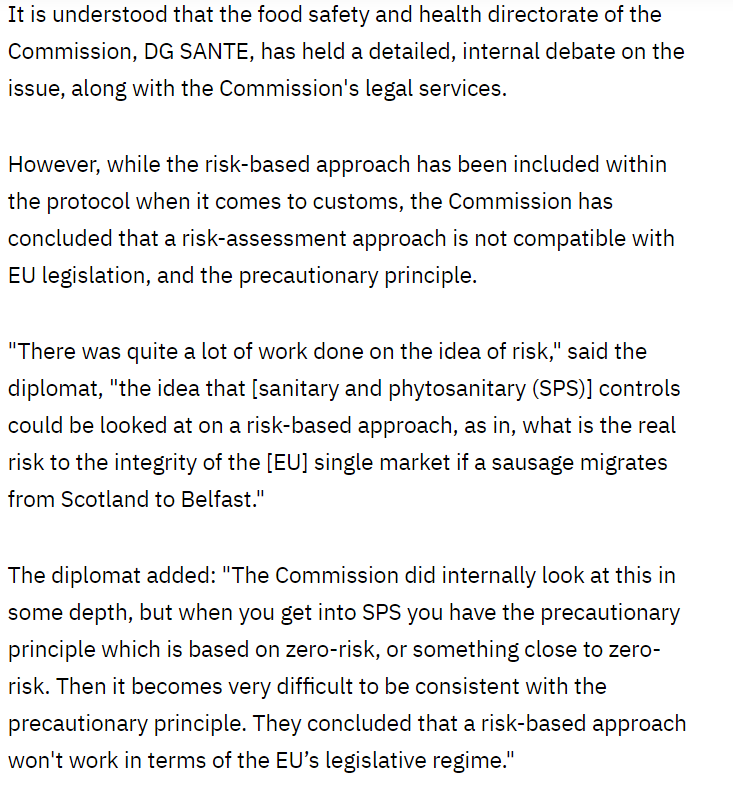
Thread on UK's new command paper on NI. As I've said before, I agree with the starting point that current implementation of Protocol isn't sustainable. That said, proposals are a mixed bag. Bits can form basis of a discussion IMO but others less so 1/ gov.uk/government/pub…
Sections 1 & 2 are largely narrative, adds little. I would note that this Govt complains about being forced into less than ideal decisions due to political circumstances but shows no understanding that those same pressures applied to previous Govt who's decisions it laments 2/
On customs the paper essentially sets out expanding 'at risk' further to mean not only are products staying in NI tariff free but also not subject to full gamut of customs processes/admin. Enforcement sounds similar to current UK Trader Scheme. 3/
A similar approach is then applied to SPS for agrifood products - only full checks/controls if destined for IRE/EU. There is though a nuance here, which says that there could be some risk based checks & controls but not on individual items...4/
This harks back to previous UK proposals to have health certificates for whole pallets or consignments rather than individual products. On both customs & SPS then there is some signal of flexibility & openness to diff ways to achieve the aim. 5/
Together this is essentially a rehashing of the 'Channels' proposal which the NICS proposed in 2017/18 & which TM Govt looked at extensively. It was reported on here for example: theguardian.com/uk-news/2018/m… and here politico.eu/article/irish-… 6/
I also proposed this as an option in 2019, see below. So there isn't really anything new here. The question is whether it can be applied now or is too significant a rewriting of the Protocol. It is also something EU has previously been sceptical on 7/ politico.eu/article/opinio… 

Next is the dual regulatory regime. This I think makes less sense. To be honest, if you can achieve a reduction of processes/admin at the border plus in terms of certification, I don't really see why this dual circulation is needed. 8/
Enforcement of this is also not set out in much detail. A lot rests on labelling. I can't think of any other precedent for this other than the Swiss approach to hormone beef from the US. But even here this isn't used by Swiss producers themselves but only to label US imports 9/
Onto Governance, which I think will come as a bit of a shock to some in the EU. There is a logic to saying if you follow the rest of what the UK is proposing there is less EU law in NI & therefore there should be less ECJ. But that isn't the narrative the UK is setting out 10/
Comparison with TCA also a bit off, because again comes down to role for EU law. There isn't in TCA therefore ECJ not needed. Hard to see that being case entirely in NI though. Moreover I guess the concern will be while trying to reduce checks UK is also reducing oversight 11/
The final substantive point of interest is the standstill proposed. While neither side will love this, it does give a way to fudge the looming crisis at the end of Sept. As history has shown, especially on NI, both sides often kick the can in parts when no other options 12/
Overall, the positives are:
- Doesn't seek to move border to N/S but keeps it E/W
- I think a genuine desire to find ways to make this work
- Recognition of need to protect integrity of EU single market (e.g. via labelling)
- Channels style proposal could work 13/
- Doesn't seek to move border to N/S but keeps it E/W
- I think a genuine desire to find ways to make this work
- Recognition of need to protect integrity of EU single market (e.g. via labelling)
- Channels style proposal could work 13/
But the negatives:
- Lots of work done on Art 16, not a big leap to triggering it
- Changes on governance surprising & not really in line with complaints on the ground IMO
- Lack of detail on enforcement such as labelling, market surveillance etc - gives little reassurance 14/
- Lots of work done on Art 16, not a big leap to triggering it
- Changes on governance surprising & not really in line with complaints on the ground IMO
- Lack of detail on enforcement such as labelling, market surveillance etc - gives little reassurance 14/
I'd also say EU shares responsibility for where we are. They won't like idea of rewriting of parts of the Protocol. But equally if EU had been more open to engaging with sensible ideas like trusted trader regime last year there is good chance this could have been avoided 15/
In the end, it is still very hard to see where this lands. A fudge using the standstill is possible in Sept. Beyond that it probably means more uncertainty for businesses & people in NI as well as a potentially worsening situation on the ground. 16/ ENDS
• • •
Missing some Tweet in this thread? You can try to
force a refresh





